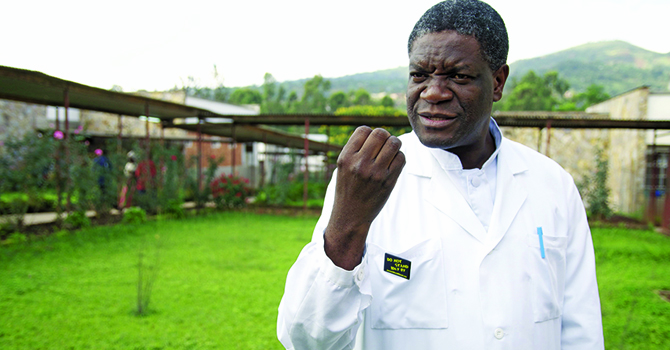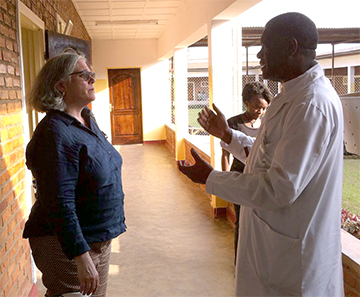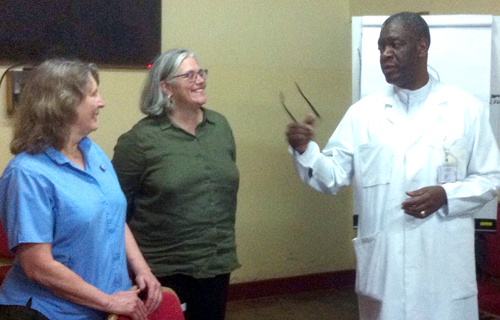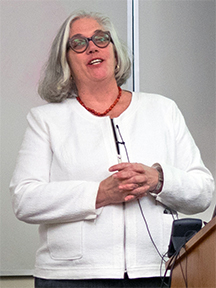Denis Mukwege, the Nobel Peace Prize, and the Suffering of Congolese Women

Siobán Harlow
Professor of Epidemiology and Global Public Health
The award of the Nobel Peace Prize to Dr. Denis Mukwege and Nadia Murad is an important recognition of their courageous efforts to help bring voice and justice to the pervasive problem of sexual violence both as an act of war and throughout all global cultures.
As a recipient of a Fulbright Scholar Award, it has been an honor to work with Dr. Mukwege and his extraordinary team of health care professionals in our joint efforts to improve scientific understanding of how to best redress the broad health and social consequences of such acts.

Our work in Democratic Republic of Congo began in 2013 with the establishment of the International Center for Advanced Research and Training (ICART). Multidisciplinary experts from Michigan in the fields of nursing, epidemiology, business, medicine and social work partner with professionals in Panzi Hospital and its associated university, Universite Evangelique D’Afrique. Launched with seed funding from the University of Michigan’s Third Century Initiative, the center has been developing training and research programs in Bukavu that address gender-based violence and clinical health issues.
The true gift of Dr. Mukwege is his insight into the interlinkages between the unspeakable physical harm he repairs in his surgical wards, the lack of responsible governance, and the upstream factors that create conditions for sexual violence.
My Fulbright work and my work with Dr. Mukwege focuses on analyzing clinical surveillance databases that track fistula and sexual violence cases in the region and evaluating innovative psychological interventions with our local partners so they can make informed clinical decisions that improve health outcomes and policyfor the local population.
Clinical surveillance databases may not be the most exciting thing to write about, but ensuring quality and utilization of these important and unique tools will be a significant part of addressing the Peace Prize mandate in this war-torn country.
The true gift of Dr. Mukwege is his extraordinary insight into the interlinkages between the unspeakable physical harm he repairs in his surgical wards, the lack of responsible governance, and the upstream factors that create the conditions for sexual violence, such as the trafficking in conflict minerals.
Following the award of the Wallenberg Medal to Dr. Mukwege in 2010, the University of Michigan has had a special relationship with Dr. Mukwege and the Panzi Hospital and Foundation that he heads. As we celebrate the significance of the Peace Prize, and our connections to this remarkable man, it behooves us as an institution to reflect on our commitment to social justice, to ending sexual violence, and to considering the role we and our institutions may play in perpetuating the social conditions that enable such violence.

As you read this note on your computer or your smartphone today, please think for just a moment about the suffering a woman has likely experienced in the Democratic Republic of the Congo as a result of conflict over the minerals essential to these electronic tools and about what we, along with our university and universities around the US, might do to help change the cycle of conflict and rape in supply chains.
About the Author
 As a reproductive epidemiologist, Siobán Harlow's research focuses on understanding
patterns of menstrual function and gynecological morbidity across the lifespan, including
leadership in studies of the natural history of ovarian aging, development of a staging
system for reproductive aging, and studies of the interface between ovarian aging
and chronic disease. Her research encompasses the development and application of statistical
methodologies that facilitate quantitative analysis of variation in physiologic processes.
As director of the Center for Midlife Science, she provides stewardship for both the SWAN and the Michigan Bone Health and Metabolism Study (MBHMS) cohort data and fosters research opportunities for junior faculty associated with
this Center.
As a reproductive epidemiologist, Siobán Harlow's research focuses on understanding
patterns of menstrual function and gynecological morbidity across the lifespan, including
leadership in studies of the natural history of ovarian aging, development of a staging
system for reproductive aging, and studies of the interface between ovarian aging
and chronic disease. Her research encompasses the development and application of statistical
methodologies that facilitate quantitative analysis of variation in physiologic processes.
As director of the Center for Midlife Science, she provides stewardship for both the SWAN and the Michigan Bone Health and Metabolism Study (MBHMS) cohort data and fosters research opportunities for junior faculty associated with
this Center.
